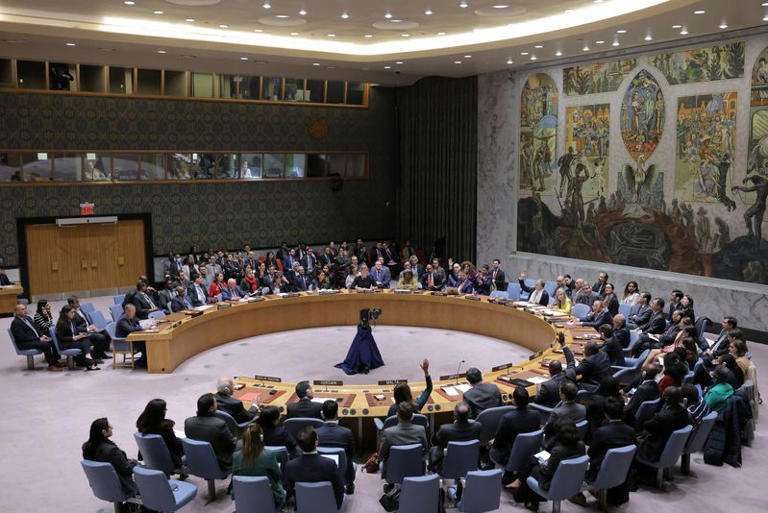History has shown that the passage of resolutions, though a positive step, is not enough to bring about meaningful change, especially when one party consistently flouts international law.
Israel’s track record of non-compliance with UN Security Council resolutions is well-documented. Time and again, Israel has disregarded the calls of the international community, undermining efforts for peace and perpetuating suffering for Palestinians in Gaza.
From settlements expansion to military incursions, Israel has persistently violated resolutions aimed at ending the cycle of violence and establishing a just and lasting solution to the conflict.
One example of Israel’s defiance of UN resolutions is its continued expansion of illegal settlements in the occupied territories.
Despite numerous resolutions condemning such actions as flagrant violations of international law, Israel has not only persisted but accelerated its settlement activities.
Moreover, Israel’s blockade of Gaza, which has been condemned by the international community as a form of collective punishment, remains in place despite calls for its lifting in previous resolutions.
In light of Israel’s consistent disregard for international law and UN resolutions, the implementation of the latest ceasefire resolution cannot be taken lightly.
It is not enough to simply pass resolutions; they must be enforced and adhered to by all parties involved. This necessitates holding Israel accountable for its actions and ensuring consequences for non-compliance.
As such, it is not surprising that the immediate remarks after the the passage of the first UN security council (UNSC) resolution for a ceasefire in Gaza, emphasized the urgent need for action.
Guterres posted on X, “This resolution must be implemented. Failure would be unforgivable.”
Avril Benoit, the U.S Executive Director of Doctors Without Borders, known by its French initials MSF, noted, “In the meantime, Council members must ensure that the ceasefire is put into action immediately and doesn’t end up being merely words on paper.”
Omar Shakir, Israel and Palestine Director at Human Rights Watch, stated that the UNSC resolution must be immediately implemented, adding, “States should use all forms of leverage – including imposing arms embargo and targeted sanctions on Israel – to press it to comply. The lives of millions of Palestinians hang in the balance.”
The head of Amnesty International said that the UN Security Council resolution is long overdue and must be “implemented immediately” on its way to resulting in an enduring ceasefire.
“Israel must immediately halt their brutal bombing of Gaza and facilitate the delivery of humanitarian aid. Israel, Hamas and other armed groups must ensure the ceasefire is durable. Civilian hostages must be immediately released. As should all Palestinians arbitrarily detained,” Agnes Callamard wrote on X.
The implementation of the ceasefire resolution is not solely a matter of geopolitical calculations but a test of our collective humanity.
It is a reminder that behind every statistic and political maneuver are real people – families torn apart, children traumatized, and communities shattered by conflict.
The implementation of the ceasefire resolution must be accompanied by concrete steps towards addressing the root causes of the conflict.
This includes addressing the underlying grievances of both Palestinians and Israelis, advancing efforts towards a just and lasting peace based on the principles of mutual respect, equality, and self-determination.
The implementation of the UN Security Council resolution calling for a ceasefire in Gaza is not negotiable.
The international community must stand united in holding all parties accountable for their actions and ensuring that the ceasefire translates into tangible relief for those who have borne the brunt of this violence.
Tensions Laid Bare
Tensions between the US and Israel were further exposed when Washington stood aside and allowed the UN Security Council to pass a resolution calling for an immediate ceasefire in Gaza.
The US abstention marks a rift with the Netanyahu government, reflecting mounting frustration in Washington at the prime minister’s defiant insistence Israeli forces will go ahead with the Rafah attack.
The text demanded “an immediate ceasefire for the month of Ramadan leading to a lasting sustainable ceasefire”. It also demanded the release of hostages but did not make a truce dependent on them being freed, as Washington had previously demanded.
In response to the US’s decision not to use veto power, Israel’s Prime Minister, Benjamin Netanyahu, cancelled a scheduled Washington trip for top aides Ron Dermer and Tzachi Hanegbi.
In a statement, Israel called the U.S abstention “a clear retreat from the consistent US position in the Security Council since the beginning of the war,” and one that “gives Hamas hope that international pressure will allow them to get a ceasefire without releasing our hostages.”
White House spokesperson John Kirby voiced disappointment that the Israeli aides will not visit Washington DC “to allow us to have a fulsome conversation with them about viable alternatives to them going in on the ground in Rafah.”
A separate set of talks between Israel’s Defence Minister, Yoav Gallant, who is already currently in Washington, and senior US officials is expected to take place.
Kirby insisted that the US decision to abstain from the UN vote does not represent a shift in policy.
READ ALSO: Government’s SSP Falls Short Of Educational Priorities


















